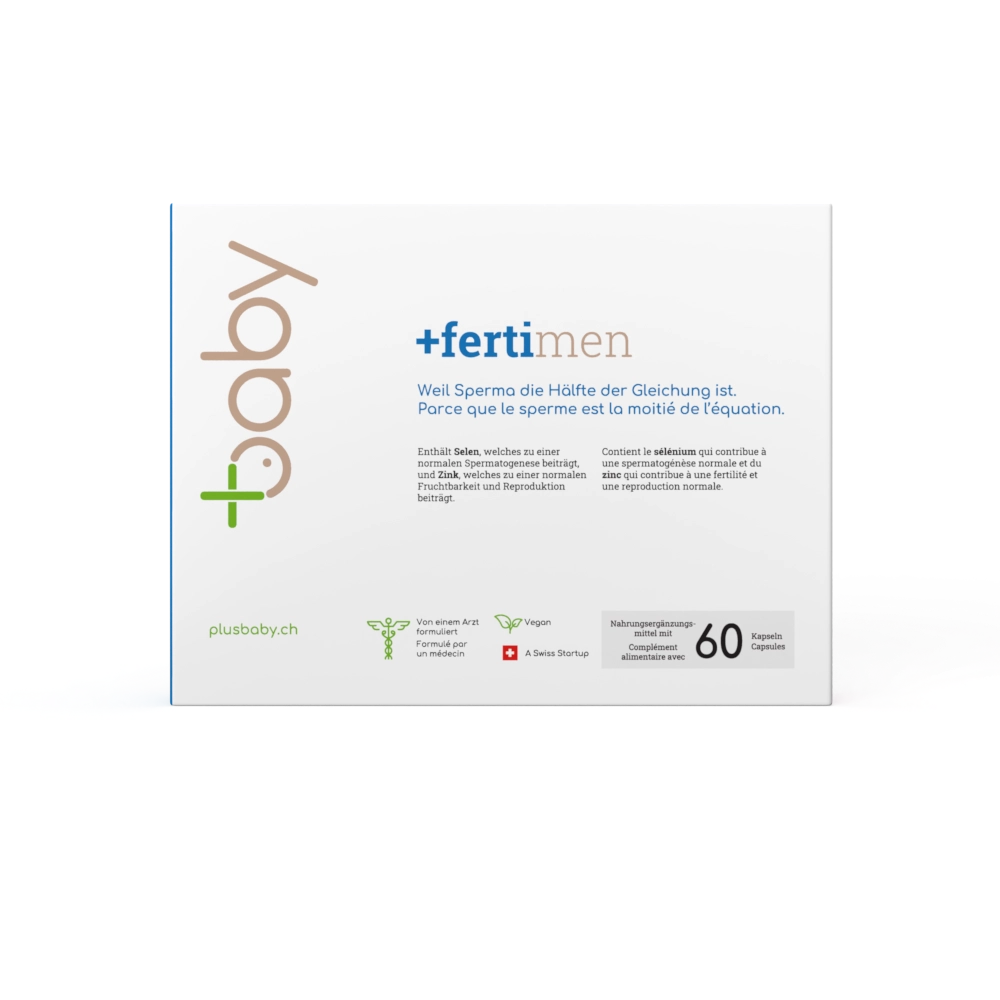Increasing fertility in men: advice and tips: Male fertility is a concern for many couples wishing to conceive a child. Fortunately, there are ways to significantly improve fertility by making lifestyle changes or by providing nutrients that are essential for healthy sperm. In this article, we’ll explore different methods that can help men increase their fertility.
Adopting a healthy lifestyle
Lifestyle has a significant impact on the reproductive health of individuals, particularly men. Here are a few things you can do to improve sperm quality:
Exercise regularly
Regular exercise plays a crucial role in improving male fertility, acting on various biological fronts. Physical activities, particularly those of moderate to high intensity, help to increase serum testosterone, a key hormone in the regulation of spermatogenesis. In addition, exercise helps to improve blood circulation throughout the body, including the reproductive organs, thereby facilitating sperm production and quality. Studies also suggest that exercise can reduce oxidative stress within the reproductive system, a factor linked to improved sperm motility and morphology.
Stop smoking
Smoking cessation is strongly recommended for individuals seeking to improve their fertility. Nicotine and other toxic substances found in cigarettes, vaping and snus have deleterious effects on sperm quality, notably by reducing sperm concentration and motility and increasing morphological abnormalities in spermatozoa. These substances also interfere with the hypothalamic-pituitary-gonadal axis, disrupting the secretion of hormones needed to regulate spermatogenesis. Nicotine can also cause vasoconstriction, reducing blood flow to the testicles and adversely affecting sperm production.
Reduce alcohol consumption
Reducing alcohol consumption is essential for those seeking to optimise their fertility. Alcohol, even in moderate quantities, can have a negative impact on reproductive health, leading to reduced testosterone production and impaired spermatogenesis. The effects of alcohol on the endocrine system also lead to a reduction in sperm quality and quantity, compromising the ability to fertilise. Studies show that abstinence or strict limitation of alcohol consumption can lead to a significant improvement in seminal parameters, underlining the importance of moderating consumption to maintain optimal reproductive function.
Get enough sleep
Adequate sleep is crucial for male fertility, directly affecting sperm quality and quantity. Sleep deprivation or alteration can unbalance reproductive regulatory hormones, such as testosterone, and increase oxidative stress, thus damaging sperm health. Research indicates that maintaining a regular, quality sleep routine can improve seminal parameters, underlining the importance of sufficient night-time rest for reproductive health.
Adopt a balanced, nutrient-rich diet
Good nutrition can have a positive impact on men’s sexual health and improve sperm quality and quantity. Here are some essential nutrients:
Zinc
This mineral plays a crucial role in sperm development and mobility. Zinc is found in a variety of foods, such as oysters, red meat, legumes and nuts.
Omega-3 fatty acids
Omega-3s are involved in a number of biological processes and also have an impact on sperm health. They can be found in oily fish such as salmon, sardines and anchovies, as well as chia seeds and linseed.
Vitamins C and E
These two vitamins have antioxidant properties, making them essential for protecting spermatozoa from damage caused by free radicals. Fruit and vegetables are excellent sources of vitamin C, while vitamin E is found mainly in vegetable oils, seeds and nuts.
Folates
Folates (vitamin B9) are involved in DNA production and are therefore crucial to sperm formation. They are found in green leafy vegetables, lentils, liver and avocados.
Food supplements to increase male fertility
While a varied and balanced diet is essential to provide all the nutrients needed for reproductive health, certain food supplements can provide additional help:
5-MTHF folate
5-MTHF folate (5-methyltetrahydrofolate), the biologically active form of vitamin B9, is essential for male reproductive health. It plays a crucial role in cell division and DNA synthesis, including sperm production. Folate deficiency can lead to a drop in sperm concentration and an increase in chromosomal abnormalities in spermatozoa, thereby reducing fertility. Supplementation with 5-MTHF improves DNA methylation and is associated with an increase in sperm quality and quantity, promoting better reproductive health.
Selenium
Selenium is an essential trace element that supports male fertility by helping to protect against oxidative stress, a factor known to damage sperm DNA. It also plays a role in testosterone synthesis and the formation of healthy spermatozoa. Adequate levels of selenium are associated with improved sperm motility, increased sperm concentration and reduced sperm DNA damage, thus contributing to better fertility.
Vitamin D3
Vitamin D3, or cholecalciferol, influences male fertility through its role in calcium metabolism and the regulation of testosterone levels. Vitamin D receptors present in the testicles, sperm and pituitary gland suggest its importance in reproductive function and sperm production. Adequate levels of vitamin D3 are correlated with better sperm quality, including improved sperm concentration, motility and morphology, as well as increased serum testosterone levels.
Arginine
Arginine is an amino acid that plays a role in the production of nitric oxide, an important vasodilator for male reproductive health. It promotes blood flow to the reproductive organs, improving erectile function and sperm quality. Studies have shown that arginine supplementation can increase sperm concentration and motility in men with low sperm motility, contributing to better fertility.
L-carnitine
L-carnitine, naturally produced in the body, is crucial for transporting fatty acids to the mitochondria, where they are converted into energy. For male fertility, it is particularly important in the testicles, where it helps maintain an optimal energy environment for spermatogenesis and sperm maturation. L-carnitine supplementation has been linked to an improvement in sperm motility and an increase in sperm concentration, potentially improving the chances of conception.
Taurine
Taurine, another important amino acid, acts as a powerful antioxidant and is involved in several cellular processes, including spermatogenesis. It helps protect sperm against oxidative damage and stabilises the sperm membrane, which is essential for sperm viability. Taurine is associated with improved sperm quality, particularly in terms of motility and viability.
Coenzyme Q10 (Q10)
Coenzyme Q10 is an antioxidant that plays a key role in cellular energy production and protection against oxidative stress. In the context of male fertility, Q10 helps to improve sperm quality, in particular by increasing sperm motility and density. Its role in protecting against oxidative damage to spermatozoa, supporting their integrity and functionality. CoQ10 supplementation has been linked to significant improvements in sperm parameters in men suffering from infertility, offering a promising therapeutic strategy for improving male fertility rates.
Zinc
Zinc is an essential mineral that influences male fertility in several crucial ways. It is involved in the regulation of testosterone, the main male sex hormone, and plays a role in DNA synthesis and cell division, processes fundamental to spermatogenesis. Zinc deficiency can lead to reduced testosterone production and impaired sperm quality, including reduced sperm count, motility and viability. Zinc supplementation has been shown to improve these parameters, underlining its importance in maintaining optimal reproductive function in men.
Each of these nutrients plays a specific and complementary role in supporting male fertility, acting through different mechanisms to improve sperm quality and function.
Omega-3
Omega-3 fatty acids, in particular EPA (eicosapentaenoic acid) and DHA (docosahexaenoic acid), are recognised for their beneficial effects on general health, including male fertility. Their action on fertility is exerted through several key biological mechanisms, including modulation of inflammation, improvement in sperm quality, and the effect on sex hormones.
The reduced inflammation resulting from omega-3 consumption may improve reproductive health by reducing the risk of conditions that can affect fertility, such as urogenital tract infections. In addition, the anti-inflammatory properties of omega-3 contribute to a better environment for the development of spermatozoa in the testicles.
The direct impact of omega-3s on sperm quality is perhaps the most studied aspect of their role in male fertility. Research indicates that these fatty acids can improve sperm parameters, including sperm concentration, motility and morphology. This is due, in part, to their ability to integrate cell membranes, thereby improving sperm membrane fluidity and function. This structural modification can potentially increase the ability of spermatozoa to survive in the female reproductive tract and fertilise an egg.
Omega-3s also have a modulating effect on sex hormones, thus indirectly influencing male fertility. They can help regulate the ratio of oestrogens to androgens, favouring a hormonal balance conducive to optimal sperm production and maturation.
Taken together, these findings support the idea that omega-3 fatty acids have significant potential for improving male fertility.
CHF 39.90 Original price was: CHF 39.90.CHF 19.90Current price is: CHF 19.90.
Managing stress and emotional health
Stress has a negative impact on sperm production and can reduce libido. So it’s essential to learn how to manage stress and look after your emotional health:
Meditation
Regular meditation promotes a state of relaxation and well-being, helping to reduce stress levels.
Socialising
Support from those close to you and communication with your partner are all factors that can help you better manage stress in your daily life.
Professional detachment
It’s important to strike a balance between your professional and personal life in order to preserve your physical and emotional health.
The impact of the environment and toxins on male fertility
Exposure to certain chemical and environmental substances can have a significant negative effect on male fertility. Studies have shown that endocrine disruptors, such as bisphenol A (BPA), found in many plastics, can mimic or interfere with the body’s hormonal system, affecting sperm production and quality. Similarly, occupational or daily exposure to heavy metals such as lead and mercury is linked to reduced fertility. Men are advised to minimise their exposure to these substances by adopting prudent behaviour, such as using BPA-free food containers and wearing personal protective equipment when necessary.
The importance of regular medical check-ups
Regular medical check-ups play a crucial role in maintaining male fertility. As well as monitoring general health, these visits allow early detection of any conditions affecting fertility, such as varicoceles, infections or hormonal imbalances. Regular semen analysis can also provide valuable information on sperm quality and quantity, enabling problems likely to affect the chances of conception to be identified.
Relaxation techniques and stress management – Increasing fertility in men
Psychological stress is known to have a negative impact on fertility. Implementing relaxation techniques, such as guided meditation, tai chi, or deep relaxation sessions, can help reduce stress and therefore support better fertility. Regular practice of these activities promotes a state of mental and physical well-being, which is essential for maintaining optimal reproductive function.
Reducing exposure to heat
Temperature plays an important role in sperm production. Prolonged exposure to heat, whether through hot baths, using laptops directly on the knees, or wearing clothes that are too tight, can increase scrotal temperature and adversely affect spermatogenesis. Loose-fitting clothing and limited exposure to direct heat sources are recommended to promote better sperm quality. I hope this help you support Increasing fertility in men.
Conclusion: Increasing fertility in men
In conclusion, improving male fertility requires a comprehensive approach, combining physical exercise, a healthy diet, targeted food supplements and stress management. By adopting these good practices, men will be able to increase their ability to conceive a child and enjoy their married life to the full.















